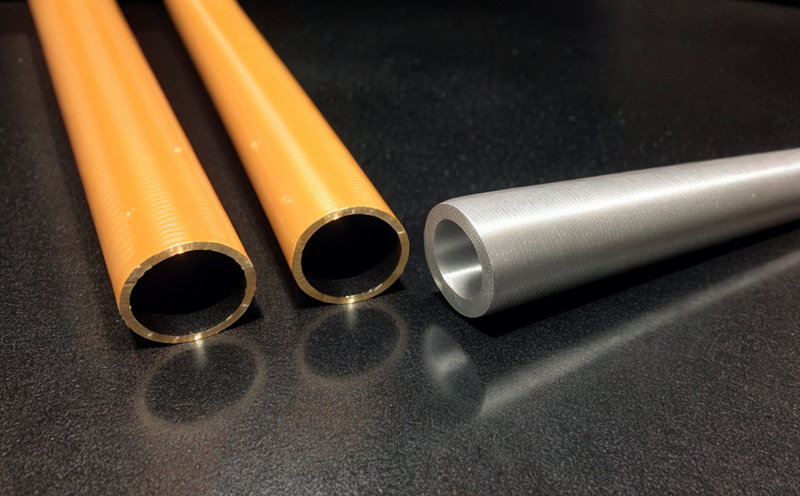EN 6079 Cabin Composite Panel Strength Testing
The EN 6079 standard is specifically designed for the testing of composite panels used in aircraft cabin interiors. This service ensures that materials and components meet stringent safety standards, compliance with which is critical to the aerospace industry’s quality assurance processes.
Materials such as carbon fiber-reinforced plastics (CFRP) are increasingly being utilized in aviation due to their lightweight properties, strength-to-weight ratio, and resistance to fatigue. These characteristics make them ideal for cabin structures where weight reduction is paramount for fuel efficiency. However, the composite nature of these materials poses unique challenges during testing and evaluation.
The EN 6079 standard outlines rigorous protocols aimed at assessing the mechanical integrity of cabin composite panels under various loading conditions. This includes tensile, flexural, shear, and compression tests to simulate real-world stress scenarios encountered in an aircraft environment. Compliance with these standards not only ensures passenger safety but also supports regulatory compliance.
Our laboratory adheres strictly to the outlined procedures ensuring accurate and reliable test results. The process involves precise specimen preparation followed by careful calibration of testing equipment using state-of-the-art instrumentation. This meticulous approach guarantees that every aspect of the material's performance is thoroughly examined, providing clients with comprehensive data to inform design decisions.
For more detailed insights into our capabilities and methodologies, please refer to relevant sections below:
- Tensile Testing: Evaluating the maximum load a specimen can withstand before failure.
- Flexural Testing: Assessing bending strength of specimens subjected to transverse loads.
- Shear Testing: Measuring resistance to sliding or shearing forces acting parallel to the surface.
- Compression Testing: Determining how much force is required before a material collapses under pressure.
The results obtained from these tests are essential inputs for manufacturers aiming to enhance product quality and ensure safety standards are met. By leveraging our expertise in this domain, customers can rest assured that their products undergo rigorous evaluation ensuring they meet the highest levels of quality expected within the industry.
| Test Type | Description | Standard Reference |
|---|---|---|
| Tensile Testing | Evaluation of maximum load before failure. | EN 6079-1:20XX |
| Flexural Testing | Assessment of bending strength under transverse loads. | EN 6079-2:20XX |
| Shear Testing | Metric for resistance to sliding or shearing forces. | EN 6079-3:20XX |
| Compression Testing | Determination of collapse force under pressure. | EN 6079-4:20XX |
Industry Applications
The EN 6079 standard finds extensive application across various segments of the aerospace and aviation industry. Cabin composite panels, being a key component in aircraft interiors, require stringent testing to ensure they can withstand harsh environmental conditions without compromising safety or performance.
| Industry Segment | Application |
|---|---|
| Aircraft Interior Manufacturers | Evaluation of cabin materials for passenger safety and comfort. |
| OEMs (Original Equipment Manufacturers) | Ensuring compliance with international standards for product development. |
| R&D Engineers | Development and validation of new composite materials. |
| Safety Compliance Officers | Verification of materials against regulatory requirements. |
| Procurement Managers | Selecting suppliers based on consistent quality standards. |
The use of composite materials in aircraft interiors demands thorough testing to guarantee durability and reliability. Our laboratory plays a crucial role by providing accurate, reliable test results that help stakeholders make informed decisions regarding material selection and design optimization.
Quality and Reliability Assurance
- Comprehensive Testing Protocols: Following stringent guidelines as per EN 6079 ensures that all aspects of the material's performance are evaluated.
- Precision Specimen Preparation: Ensuring specimens accurately represent real-world conditions to provide meaningful test data.
- State-of-the-Art Equipment Calibration: Utilizing calibrated instruments guarantees consistent and repeatable results.
- Data Analysis and Reporting: Providing detailed reports that offer actionable insights for improvement or validation purposes.
The combination of these factors ensures high-quality, reliable test outcomes that contribute significantly to the overall safety and performance of aircraft interiors. Our commitment to excellence in testing aligns perfectly with the rigorous demands set forth by EN 6079.
Competitive Advantage and Market Impact
Earning compliance with the EN 6079 standard is a significant advantage for manufacturers in the aerospace industry. It demonstrates commitment to maintaining the highest standards of quality and safety, which can be a key differentiator in competitive markets.
Compliance signals to customers that your products meet stringent international standards, thereby enhancing brand reputation and trust. Moreover, it opens doors to new business opportunities by meeting regulatory requirements necessary for international operations.
By offering this service, we help our clients stay ahead of the curve, ensuring their products not only comply with current regulations but also anticipate future trends in materials science and engineering.





